- Home
- Allison Brennan
Killing Fear Page 2
Killing Fear Read online
Page 2
Freedom that had been stolen from him by a stripper whore and the cop she was screwing.
The fog hung like a wet blanket over the exercise yard. Depressing and unnatural—Theodore despised the entire area. He missed the sun of San Diego, its warm beaches and hot days.
His appeal was only two months away, and he wouldn’t be returning to prison no matter what happened in court.
He pulled out the letter to Robin and tore it into tiny pieces. Fucking lying bitch, you will pay for what you did to me!
As Theodore watched the paper float to the ground, the earth began to shake violently, back and forth. It threw him to the ground. What he would remember most about those thirty-two seconds was the overwhelming sound. He’d never realized an earthquake could be so loud.
It wasn’t just the quake that caused the ear-splitting noise, but the collapse of the twenty-foot-high concrete wall separating the condemned inmates from the San Francisco Bay.
There were six guards posted on the catwalk outside the East Block wall, with .223 caliber mini rifles trained on the yard. But if Glenn couldn’t stay upright, they certainly wouldn’t be able to. He was banking on it.
Dust hung heavy in the air, burning his lungs, but Theodore Glenn jumped up and got moving. He’d felt more than seen the collapse of the concrete walls. Right in the middle they’d tumbled down, the weight of the crumbling rock yanking more of the wall to the ground, including at least one of the guards.
He ignored the sirens vibrating through the complex. Freedom was only a dozen yards away—over the concrete rubble. Theodore couldn’t see the guard tower outside the fence. Had that collapsed as well? He could hope. If not, he would hope that enough of the condemned ran and he would not be shot.
Barely heard over the squeal of the alarms, there was erratic gunfire. Shouts from the catwalk caught Theodore’s attention. He looked up, barely able to see the guard at the far south of the walk. The man was limping, but functional. Where were the others? Had they fallen to the other side? Twenty feet probably wouldn’t kill them, but they’d likely be immobile.
Theodore carefully started up the slope that had been the wall. Razor wire, embedded in the destroyed wall, was now everywhere. While his sturdy shoes protected his feet, he couldn’t use his hands for fear of slicing them. If he made it over the debris, he didn’t want open cuts because there was only one way out:
The San Francisco Bay.
He sensed other inmates following him, and two were ahead. He saw the crooked arm of a guard, his green uniform covered in dust. Trapped by the concrete when it fell. Dead? Very likely. Theodore scanned the area for a rifle as he continued moving forward, up the concrete mountain. The weapon must be buried with the dead guard.
A voice from the far side of the catwalk ordered Theodore to stop. He didn’t hesitate, but continued climbing the collapsed wall. He spied another guard near the top of the rubble, this one not dead but injured, blood pouring from a head wound. He kept shaking his head as if to clear it, but held fast to his rifle, which swung erratically to and fro. It didn’t look like the guard could see much of anything, blood covering one eye. His expression was panicked. Fearful.
Theodore realized then that the guard who had ordered him to stop was trapped on the far side of the catwalk, which had partially collapsed, pulled down by the weight of the falling wall. Where were the other guards? The air was thick with dust and fog, Theodore wasn’t sure what he was seeing.
“Stop!” the guard called again, but he was aiming his gun behind Theodore. How many were following him? Why wasn’t the guard shooting? Afraid to hit a fallen officer?
Over the loudspeaker, a voice commanded, “Down! Lay facedown, hands behind your head or you will be shot.”
Theodore ignored the warning. A guard was pursuing him, but the yard guards had nonfatal rubber bullets. Behind him were shouts and screams.
Reaching the wounded guard, without hesitation Theodore ripped the rifle from his shaking hands. The bastard should have shot first, he thought with a tight grin. With the stock of the rifle, Theodore hit the fallen guard twice—wham! wham!—on the head.
He collapsed, unconscious and more likely dead. Gun in hand, Theodore rolled down the far side of the wall.
“You bastard! You didn’t need to kill him!”
Theodore turned to fire the rifle, thinking it was a pursuing guard. Instead, he saw convict Thomas O’Brien, another condemned man recently transferred from North Seg, the country club of death row. O’Brien rolled down behind him, cutting his hand on razor wire.
Theodore aimed the rifle at the traitorous prisoner. He’d had a suspicion about O’Brien ever since he walked into East Block last week.
A bullet whizzed past Theodore. He wished he’d had time to retrieve the guard’s sidearm, but it was buried along with the dead guard’s legs. Instead of killing his fellow prisoner, Theodore turned and returned fire. Enough to give him cover.
The earth rolled beneath him. Aftershock.
He didn’t fall, but O’Brien did. The guard pursuing them also stumbled.
Gunfire echoed around him and he zigzagged through the short open space. He spared a glance toward where the main guard tower should be.
It wasn’t there.
Sirens, shouts, gunfire sounded all around. Theodore ran. The two convicts in front of him jumped into the bay. He followed.
He swam northeast, away from San Francisco and the violence of the bay; toward the Richmond–San Rafael Bridge. If he could reach the bridge, he’d have a better chance of escaping.
The cold water burned his hands. He realized he had cuts all over them, small nicks that the saltwater turned to searing pain.
He slung the gun over his shoulder. It would be worthless in the water, but he could dry it out, use it again, if he was lucky.
He swam. Heard splashes behind him, others following suit. His active, rigorous lifestyle before prison had given him physical strength, which he’d maintained over the last seven years. If anyone could survive the San Francisco Bay, it was him. He was certain of it.
The more convicts on the run, the greater chance he had to escape. They would be slower than him. Already he had passed the two convicts who’d jumped ahead of him.
The water froze and burned, it was early February, light was fading, all he needed was the cover of dark and stamina, and he would be free. He’d been waiting for this opportunity, the first chance to be free. To think he’d wasted the last seven years on appeals when all he’d had to do was relax and wait for an act of God!
He almost laughed. Instead, he gritted his teeth against the pain and cold of the San Francisco Bay, found his rhythm, and swam hard through the choppy water.
Adrenaline surged through his blood, triggering every cell in his body. He’d never felt so alive.
TWO
Robin McKenna lingered in the Back Room—her VIP lounge—one ear tuned to the plasma-screen television in the corner. It usually aired whatever major sporting event was being telecast. While The Eighth Sin wasn’t a sports bar, she allowed the TV in deference to her longtime regulars. Today they were irritated with her that she switched from ESPN to a local station which was airing reports on the earthquake that had hit near San Quentin.
Early reports stated the possibility of prisoners having escaped. Out of the hundreds of death row inmates housed in the East Block, surely Theodore Glenn wasn’t one of the handful who had managed to flee, Robin tried to convince herself. If any prisoners had in fact escaped. There were still people trapped in the rubble. Head counts needed to be done, bodies recovered.
But Theodore Glenn wasn’t just any inmate. If anyone had the will and stamina to escape, it would be Glenn. Robin couldn’t dismiss her nagging fears. So she kept coming back to the bar even though it was Saturday night—her busiest—and she should be in the main hall where the music pulsed and people danced and drank, saw and were seen.
She couldn’t walk away from the news. She had to know.
; Then it happened. Her worst fear.
“Unconfirmed reports from authorities at the Department of Corrections state that up to twelve prisoners may have escaped during the earthquake that rocked San Quentin ninety minutes ago. No confirmation on who, but an earlier report stated that mass murderer Vincent Paul Porter was apprehended when he emerged from the bay a mile north of the prison. An anonymous citizen captured and restrained him until authorities arrived. And Theodore Alan Glenn, who murdered four prostitutes in San Diego, is at large after allegedly killing an injured prison guard.”
No, no, no!
She watched as the mug shot of Theodore filled the screen, along with his vital statistics. Hair: Brown. Eyes: Blue. Height: 6'2". Weight: 190. Tattoos: None.
Theodore Glenn was handsome. Everyone had thought so, or at least all the other dancers at RJ’s had. Why was it that only Robin had seen his dark side? Every time he looked at her all those years ago she’d felt icy cold. Brandi thought Robin’s fears of Theodore were groundless, that she’d simply been an overprotective friend. She laughed and teased Robin, “You’re the only stripper I’ve ever met who’s a prude.”
She wasn’t a prude, but she didn’t like when dancers dated patrons. It erased the line between customer and dancer, created an intimacy where there should only be business and mystery. Stripping was her job, not her life. She did it for the money, not the attention.
Glenn’s description seemed vague, and the photo flashed on television seemed to show an ordinary, yet handsome fortyish man. It didn’t show the ice blue of his eyes, nor the cold emptiness where his soul should be. Robin could hear people now, “He doesn’t look like he could hurt anyone. Maybe he was telling the truth during the trial. Innocent people go to prison. Remember that case…?”
He was not innocent. Robin knew it and she wouldn’t be at peace until he was back in prison. He had killed four of her friends. And he’d have kept killing until he got to her.
“They weren’t prostitutes!” Robin said through clenched teeth, focusing on her anger instead of her fear. They were exotic dancers, strippers, whatever you wanted to call them. But they didn’t have sex for money.
Theodore Glenn had escaped. There was no doubt in Robin’s mind that he was capable of any vicious act, like killing an injured guard in cold blood.
Robin didn’t realize she’d dropped the two martini glasses she’d been holding until the pungent smell of gin rose in the air. She glanced down at the rubber mat. One glass had bounced, the other had a broken stem. She bent down, picked up the pieces, and tossed them in the trash.
Theodore would run to Mexico. Or Canada. Somewhere else. Anywhere but here, right?
Even as she thought it Robin recognized her wishful thinking. Theodore Glenn would be coming back to San Diego to make good on his courthouse threats.
She remembered the letters she used to get from him. She’d mistakenly opened and read the first one. Then she burned them, unopened and unread.
But she knew he wouldn’t forget his promise to kill her.
“Hey, sugar, my drink.”
Kip, one of her regulars, frowned at the spilled drinks and broken glass.
“Sorry, Kip.” She smiled widely, putting back on her show face. She was good at that.
“Never seen you with slippery fingers. Used to slide up and down a pole like nobody’s business, though.” He winked at her. Kip was one of the few who had stayed after she bought RJ’s and converted it from a strip club to an urban dance club. He had just celebrated his seventieth birthday.
She gave him a warm smile and poured another extra-dry martini.
“You’re not worried about that guy coming back, are you?”
She shook her head, but her smile faltered.
“Sugar, they’re going to catch him. Or he’ll disappear down in Mexico. Sun it up on the beach somewhere. If he comes here, I’ll take care of him, don’t you worry. I wouldn’t let him hurt you.”
Robin kissed Kip on his thin, leathery cheek as she placed his drink on a coaster in front of him. “My white knight.”
She turned, glanced back at the television. Someone from the U.S. Geological Survey in Menlo Park was talking about the heretofore unknown fault that had apparently been triggered by some shift deep in the earth. “The temblor, which occurred at four thirty-one earlier this evening, had a magnitude of seven point nine and was centered within the boundaries of San Quentin State Prison.”
Because San Quentin prison was so old, it didn’t surprise the expert that some structures collapsed.
She turned ESPN back on, done with the news. But it was halftime for whatever game was being aired and they were cutting into a national feed about the earthquake.
She shut off the television and motioned to Ginger, her best cocktail waitress and backup bartender. Robin asked her to take over the bar. “I need to go home.”
“Is something wrong?”
Not everyone knew what had happened seven years ago. Not everyone had a killer walk into their lives. “I just need to do something. If I’m not back by closing, can you stay?”
“Sure, but—”
“Thanks, Ginger. I really appreciate it.” She ducked under the bar pass-through and scurried to her office before Ginger asked any more questions. She’d figure it out before too long. As soon as word got out about Glenn, the press would run another story, her name and picture would be plastered in the papers, she’d have to suck it up. She had a successful business to run, and she wasn’t going to let the murderous bastard ruin that for her.
She would give herself tonight to pull herself together. She had to. For her business, for her sanity.
It wasn’t just Glenn who would be walking back into her life.
She grabbed her purse from her office and exited via the alley. The former “gaslight district,” now known by the less scandalized “gaslamp district,” had been cleaned up and renovated with redevelopment funds—which she had used to change RJ’s from a low-class strip joint to a chic, urban dance club and gentleman’s bar. Whereas ten years ago she’d never have walked through this alley alone, now the police presence kept the drugs off the main streets and criminals had been pushed out.
She walked two blocks, turned onto Fifth Street and walked two more blocks to the loft she had bought three years ago. All the warehouses on this street had been bought by a developer who converted the bottom floors to businesses, and the upper floors to lofts. She was one of the first to buy, and the space was one huge room on the top floor. It had twenty-foot ceilings and lots of tall windows. She’d put up partial walls and designed the space to maximize the sunlight so she could paint in the mornings. She’d been making a name for herself in the art community and had her first big art show coming up next weekend. She’d started painting as a hobby and discovered she loved it. She created bold, colorful, vibrant pictures, taking familiar scenes and making them special.
Her lights blazed behind the tall narrow windows of her loft. A timer turned them on before sunset. She would never walk into a dark room.
Seven years ago she’d walked into a dark nightmare that had been revived tonight with Glenn’s escape.
She locked and bolted the door behind her, heart pounding.
“There’s no way he can get to San Diego that fast,” Robin said out loud. Her cat, Pickles, the fluffy gray and white tabby who used to belong to Anna, wound around her feet, purring. Robin picked him up and held him to her face. His purr grew louder.
“Yeah, I know, I’m not supposed to be home this early.”
She fed Pickles, saw the blinking light on her answering machine. She pressed PLAY.
The machine intoned, “Message one, seven p.m. Saturday.”
Then her mother’s voice. “Robin, it’s your mom. I’m sitting on the beach right now drinking a piña colada. Maui is so beautiful! I wish you were here with me. You work too hard, sweetheart. You need to have fun. I love you! ’Bye!”
Robin smiled, in spite of her mixed feelings. Did
i McKenna had no idea of what anything cost. Her spontaneous trip to Hawaii drained her savings account and while there she would probably max out her credit cards. Robin wouldn’t have cared so much except that she had bailed her mother out of financial messes more than once.
“Ms. Robin McKenna, this is Officer Diaz from the San Diego Police Department.”
Robin froze as the answering machine continued with the message.
“I’m sorry to be calling so late, but this afternoon there was an earthquake near San Quentin State Prison and Theodore Glenn escaped when a wall collapsed in the prison exercise yard. We are taking precautions and notifying everyone who was involved in his prosecution that Glenn is missing and presumed at large. If you have any questions, please call me at 619-555-1100.”
Robin pounded the erase button, as if it could make tonight disappear. Like she didn’t know Theodore had escaped! What good would it do to notify her? What good would it do anyone? If Theodore wanted to get to someone, he’d find a way.
Petting her cat, she walked through the loft to her bedroom. Her sleeping area was separated from the rest of the loft by three antique black silk screens. She put Pickles on the bed and sat, staring at her nightstand. Her fear was palatable: she tasted it, her pores oozed it, her hair tingled.
Why me?
Robin rarely indulged in self-pity. Seven years ago she’d had to shore herself up against it as well. It would have been easy to hide forever, to move back home with her mother, to disappear. But she hadn’t. She’d faced the press, faced the court, helped put Theodore Glenn behind bars.
“Why don’t you like me, Ms. McKenna?” he’d asked.
How to answer a question like that? She’d felt his evil. Deep down, she knew it. The way he looked at her. The way he made her feel: cold and petrified.
He’d never said anything cruel to her. He’d never done anything to her. He simply watched her, but she had grown terrified. Irrational. At least she’d thought so at the time.

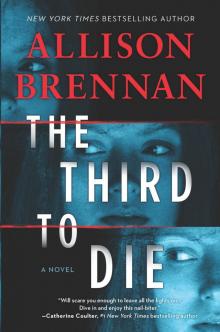 The Third to Die
The Third to Die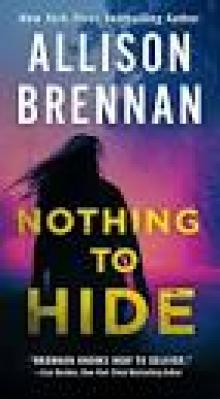 Nothing to Hide
Nothing to Hide No Way Out
No Way Out Cold as Ice
Cold as Ice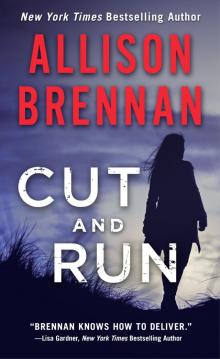 Cut and Run
Cut and Run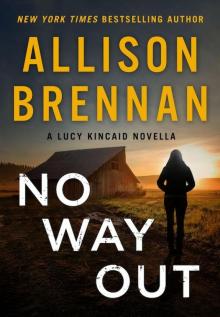 No Way Out (Lucy Kincaid Novels)
No Way Out (Lucy Kincaid Novels) Storm Warning
Storm Warning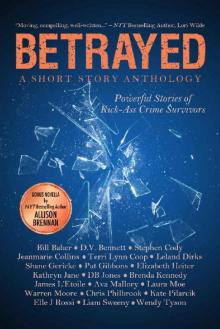 Betrayed: Powerful Stories of Kick-Ass Crime Survivors
Betrayed: Powerful Stories of Kick-Ass Crime Survivors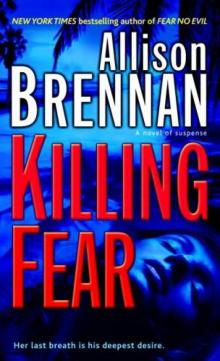 Killing Fear pb-1
Killing Fear pb-1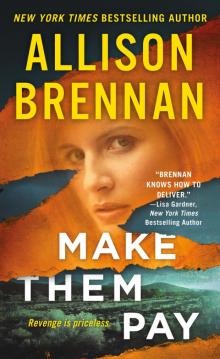 Make Them Pay
Make Them Pay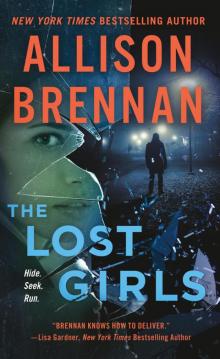 The Lost Girls
The Lost Girls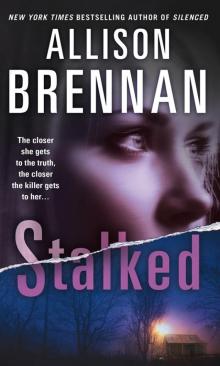 Stalked
Stalked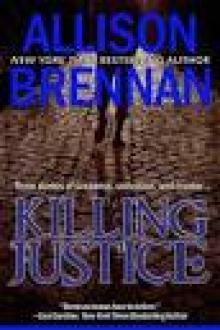 Killing Justice
Killing Justice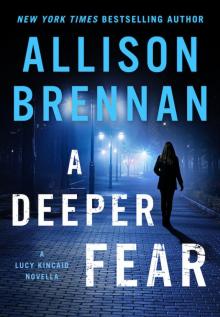 A Deeper Fear
A Deeper Fear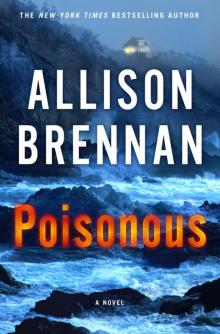 Poisonous
Poisonous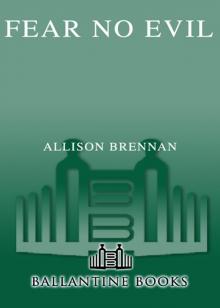 Fear No Evil
Fear No Evil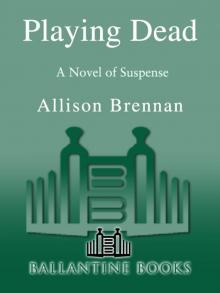 Playing Dead
Playing Dead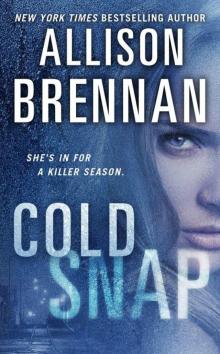 Cold Snap
Cold Snap Vacation Interrupted
Vacation Interrupted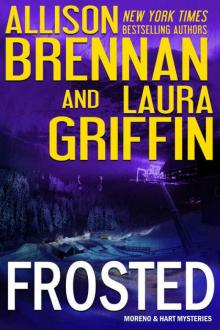 Frosted (Moreno & Hart Mysteries)
Frosted (Moreno & Hart Mysteries)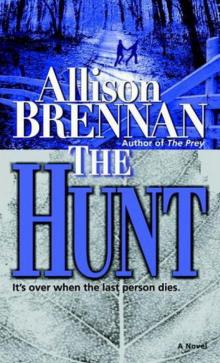 2 - The Hunt
2 - The Hunt Stolen
Stolen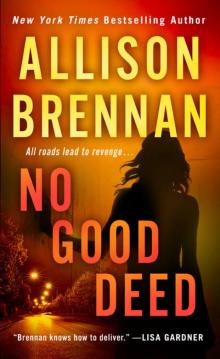 No Good Deed
No Good Deed Cutting Edge
Cutting Edge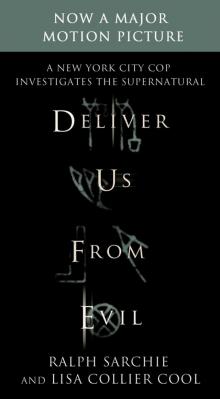 Deliver Us from Evil
Deliver Us from Evil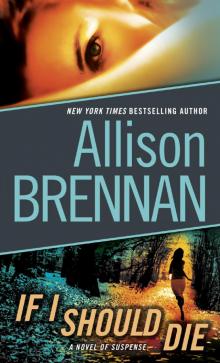 If I Should Die
If I Should Die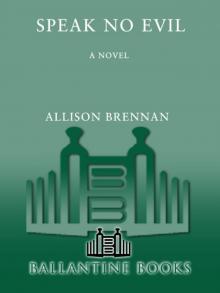 Speak No Evil
Speak No Evil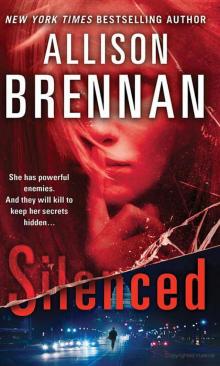 Silenced lk-4
Silenced lk-4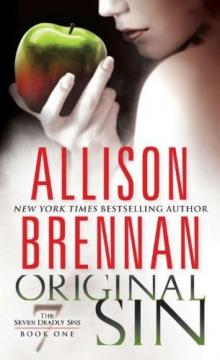 Original Sin sds-1
Original Sin sds-1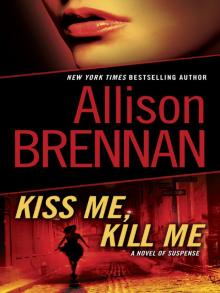 Kiss Me, Kill Me lk-2
Kiss Me, Kill Me lk-2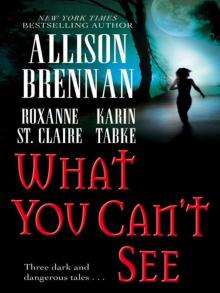 What You Can’t See
What You Can’t See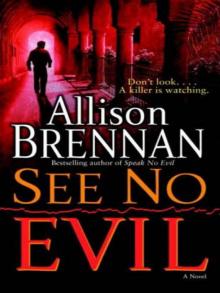 See No Evil
See No Evil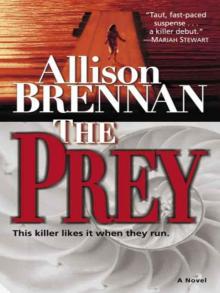 The Prey
The Prey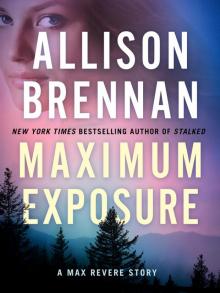 Maximum Exposure
Maximum Exposure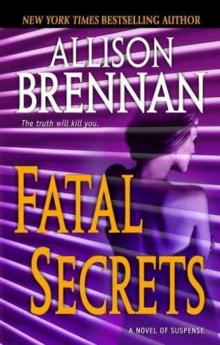 Fatal Secrets f-2
Fatal Secrets f-2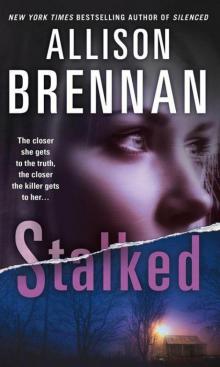 Stalked lk-5
Stalked lk-5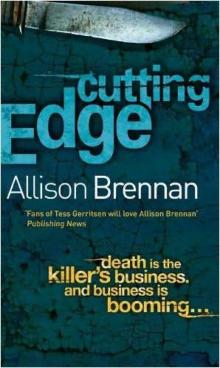 Cutting Edge f-3
Cutting Edge f-3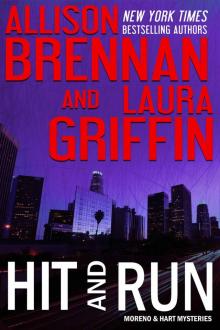 Hit and Run (Moreno & Hart Mysteries)
Hit and Run (Moreno & Hart Mysteries)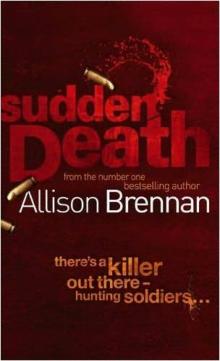 Sudden Death f-1
Sudden Death f-1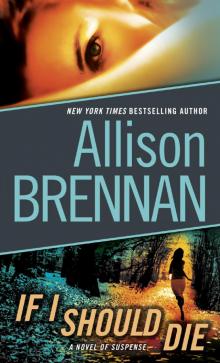 If I Should Die lk-3
If I Should Die lk-3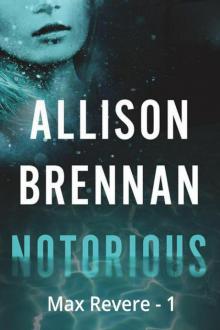 Notorious
Notorious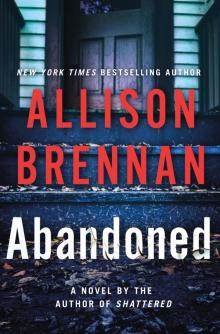 Abandoned
Abandoned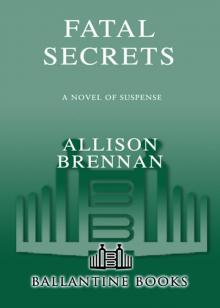 Fatal Secrets
Fatal Secrets The Hunt
The Hunt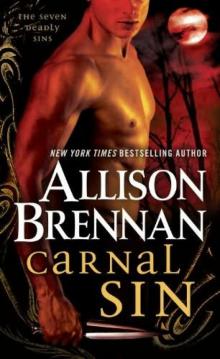 Carnal Sin sds-2
Carnal Sin sds-2 Love Is Murder
Love Is Murder Lost and Found
Lost and Found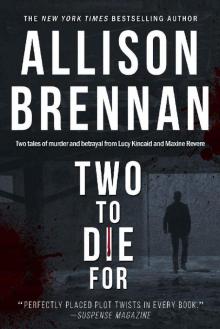 TWO TO DIE FOR
TWO TO DIE FOR Breaking Point
Breaking Point Best Laid Plans
Best Laid Plans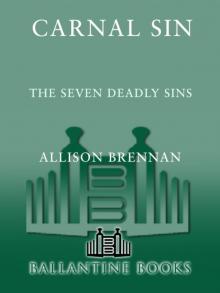 Carnal Sin
Carnal Sin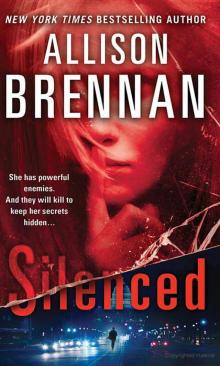 Silenced
Silenced Dead Heat
Dead Heat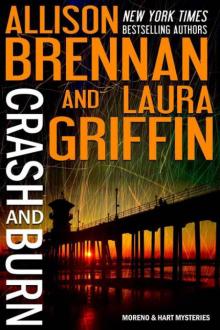 Crash and Burn
Crash and Burn Sudden Death
Sudden Death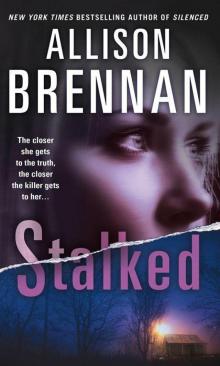 Lucy - 05 - Stalked
Lucy - 05 - Stalked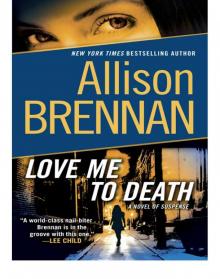 Mortal Sin
Mortal Sin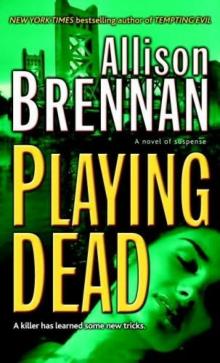 Playing Dead pb-3
Playing Dead pb-3 Kiss Me, Kill Me
Kiss Me, Kill Me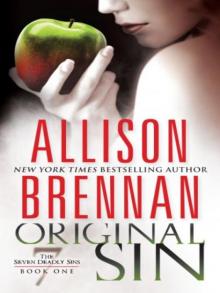 Original Sin: The Seven Deadly Sins
Original Sin: The Seven Deadly Sins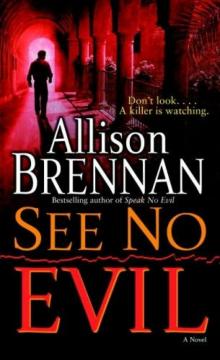 See No Evil e-2
See No Evil e-2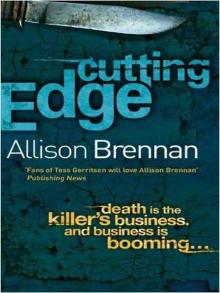 Cutting Edge: A Novel of Suspense
Cutting Edge: A Novel of Suspense Original Sin
Original Sin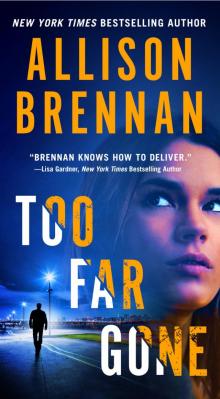 Too Far Gone
Too Far Gone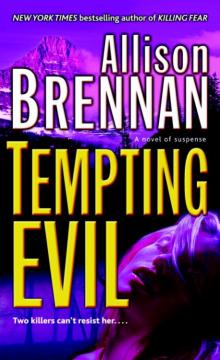 Tempting Evil
Tempting Evil Shattered
Shattered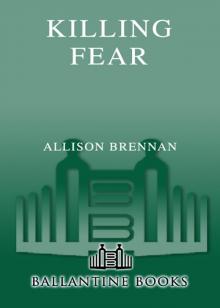 Killing Fear
Killing Fear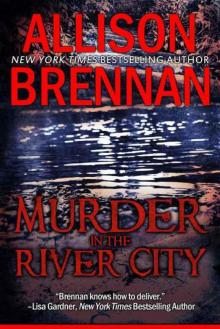 Murder in the River City
Murder in the River City Love Is Murder (lucy kincaid)
Love Is Murder (lucy kincaid)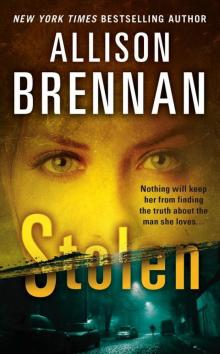 Stolen (Lucy Kincaid Novels)
Stolen (Lucy Kincaid Novels)